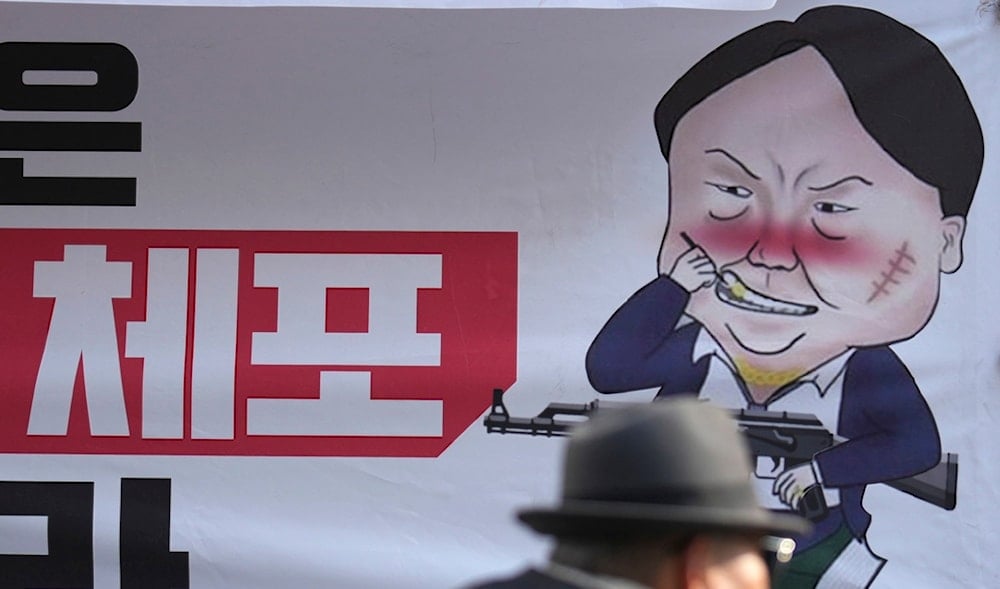South Korea-US alliance undeterred despite leadership crisis: MoD
Although South Korea faces its most severe leadership crisis, the Ministry of Defense confirms that bilateral relations with the US remain unbroken.
-

A caricature depicting South Korean President Yoon Suk Yeol is seen near the ruling People Power Party's head office in Seoul, South Korea, Dec. 9, 2024. The letters read "Arrest." (AP)
South Korean President Yoon Suk Yeol remains the commander-in-chief, and the US-South Korea alliance remains unaffected, the country's Defense Ministry stated on Monday following revelations that Yoon is under criminal investigation for declaring martial law last week.
Questions about Yoon's hold on power have arisen as dissent among senior military officers grows, and his party announces plans to form a task force to prepare for his potential resignation. Although the impeachment vote against Yoon failed, his party's delegation of the presidential authority to the prime minister spiraled the country into a constitutional crisis.
Yoon has also been refusing calls to resign, including those coming from members of his own party. However, his future seemed more uncertain over the weekend, amid the criminal investigation he was under for alleged treason, the Yonhap news agency reported.
Yoon's move to impose emergency rule and expand military authority sparked widespread street protests and concern among Seoul's allies.
As a result, US Defense Secretary Lloyd Austin canceled his planned visit to South Korea, while Secretary of State Antony Blinken contacted his South Korean counterpart, emphasizing the importance of upholding the democratic process.
Military establishment displeased with defense minister
Moreover, South Korean prosecutors have arrested former Defense Minister Kim Yong-hyun for his alleged involvement in President Yoon Suk Yeol’s martial law declaration earlier this week, according to local media reports.
Kim, who resigned on Wednesday, is widely regarded as a key figure in the brief martial law declaration issued on Tuesday. A senior military official and opposition members filing for Yoon’s impeachment claimed that Kim had proposed the martial law measure to the president.
Prosecutors have also imposed a travel ban on Kim and conducted raids on his official residence and office. Meanwhile, three minority opposition parties filed treason charges against Yoon, Kim, and martial law commander Park An-su.
In a notable display of dissent within the military, the commander of South Korea's special forces revealed he was ordered to deploy troops to parliament last week to block a vote rejecting martial law. Colonel Kim Hyun-tae, who leads the 707th Special Missions Group, stated he followed directives from then-Defense Minister Kim Yong-hyun and took responsibility for his troops' actions.
"We were all victims who were used by the former defense minister," Colonel Kim said outside the defense ministry in Seoul. He admitted he had not informed the military about his decision to speak to the media, fearing intervention to silence him.
Moves to preserve South Korea's economy
The martial law declaration plunged South Korea, Asia’s fourth-largest economy, into its most severe political crisis in decades, raising concerns about the country’s future.
Opposition leader Lee Jae-myung cautioned on Monday that the political crisis could inflict lasting damage on South Korea's economy, a key global supplier of memory chips and the fourth-largest in Asia.
In response, the Finance Ministry and regulators pledged to stabilize financial markets by implementing contingency measures and increasing liquidity by the end of December.
Read more: South Korean President issues apology for imposing martial law

 3 Min Read
3 Min Read








